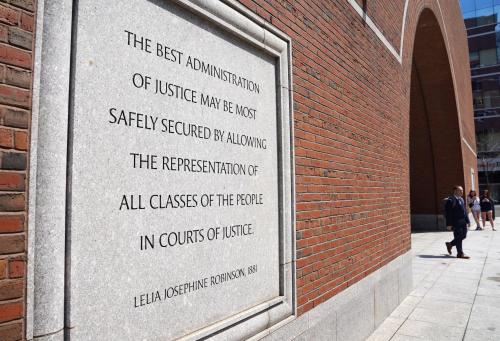The recent Supreme Court decision to strike down the use of race as a factor for assigning children to public schools has reignited the debate about the progress of race and opportunity in the U.S. The decision took center stage the next day at the Democratic Party’s presidential debate hosted by PBS’s Tavis Smiley, and will likely animate future debates and venues as presidential hopefuls come before African American voters. As they do, presidential candidates should speak to the most basic aspirations of many African Americans, and Americans as a whole—the opportunity for themselves and their children to climb the ladder to the middle class and beyond.
To be sure, the Supreme Court’s landmark decision comes at a time when overall opportunity in America has been under scrutiny.
As a whole, real economic progress among most American households is slim relative to the wealthiest among us. The gap between the rich and poor has reached the widest point in the last half century, primarily due to one phenomenon: the incomes of the superrich are pulling ahead from the rest of ours at an exponential rate relative to everyone else.
Meanwhile, low-income workers and the middle class, despite working longer hours and being more productive, seem to be stuck in place: wages for the average worker have been stagnant since the early 1970s, and wealth accumulation for all but the very well-off has flat-lined.
And worse, the path to upward mobility for many people of color remains strewn with speed bumps at best.
We argue that there are four critical “pathways” to the middle class that need to be fortified and expanded if we want to see real economic gains for families seeking access to and security in the middle class: (1) increasing the number of low-income students enrolled in and completing postsecondary programs; (2) improving access to good jobs that pay middle-class wages and offer benefits and opportunities for advancement; (3) fostering economically viable and diverse neighborhoods that facilitate wealth building; and (4) promoting personal financial security through financial literacy and access to fair and well-priced financial services and products.
For people of color, these important pathways to economic mobility are especially tenuous. Nonwhites, and particularly African Americans and Hispanics, earn less, receive less education, and accumulate less wealth than whites. In 2002, the high school drop out rates for African American and Hispanic students were 44 and 46 percent, respectively, well below white students’ rate of around 22 percent. African Americans and Hispanics are less likely than whites to be employed in jobs that offer health care coverage. And middle-class minorities are less likely than white middle-class households to own their own homes and to invest in stocks.
The public’s frustration with the sense of uneven opportunity is real. A recent poll conducted by the University of Connecticut found that seven in 10 respondents believe the income disparities in the U.S. are too stark.
Americans by and large do not crave solutions that take from the rich and give to the poor. Instead, they want political leaders to enact policies that will help the typical working American to reap the benefits of his or her labor.
In short, presidential aspirants must set forth a clear agenda to open up the pathways to economic success for all hardworking Americans, including people of color who work and play by the rules. By doing so, they will ensure better opportunities for the children of working parents. And they will restore the upward and intergenerational opportunities that have historically set the United States apart from all other nations.
The authors wish to thank Oliver Sloman, Brookings research assistant, for his substantive contributions.
Related Content from Opportunity 08![]() Opportunity 08
Opportunity 08
 Opportunity 08 is a project of the Brookings Institution in partnership with ABC News. To help broaden the discussion of America’s policy challenges, policy forums and information will be featured on the ABC News website and on ABC News Now, which provides live 24/7 news coverage online, on television and on mobile devices. The material will also be featured on the project website, www.opportunity08.org.
Opportunity 08 is a project of the Brookings Institution in partnership with ABC News. To help broaden the discussion of America’s policy challenges, policy forums and information will be featured on the ABC News website and on ABC News Now, which provides live 24/7 news coverage online, on television and on mobile devices. The material will also be featured on the project website, www.opportunity08.org.
The Brookings Institution is committed to quality, independence, and impact.
We are supported by a diverse array of funders. In line with our values and policies, each Brookings publication represents the sole views of its author(s).



Commentary
Op-edAdvancing Economic Success for All Americans
July 10, 2007